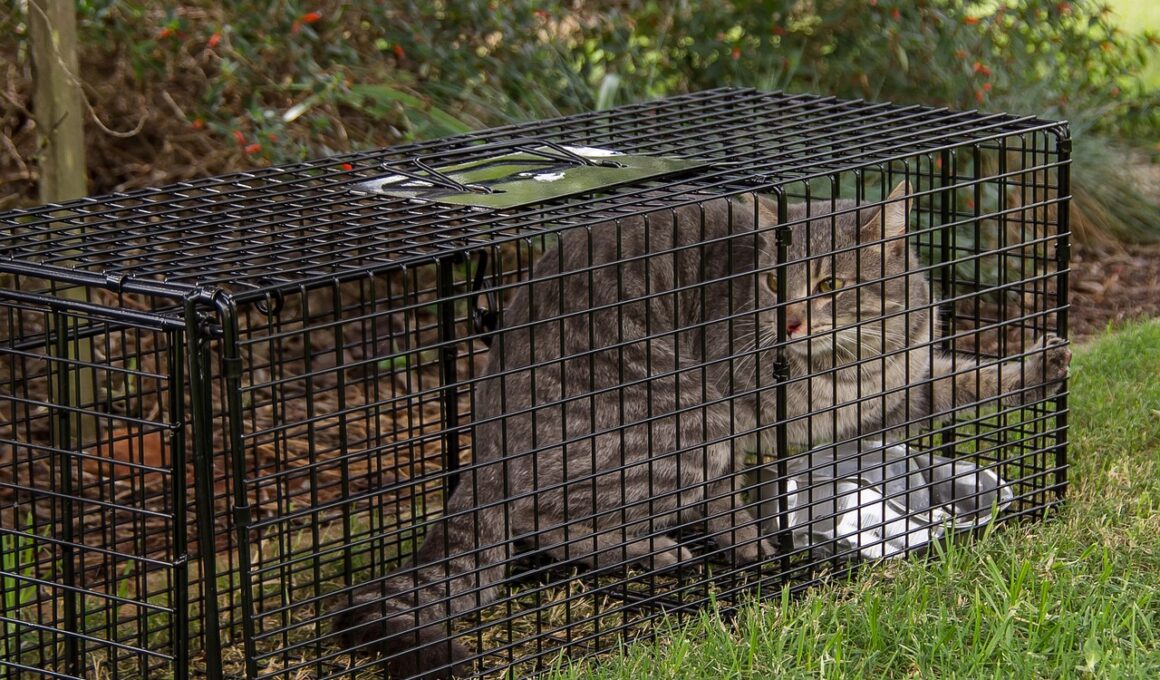Managing Internal Parasites: Worms That Affect Cats
Managing internal parasites in cats is crucial for the health and well-being of your feline companions. There are several types of worms that can infect cats, with roundworms, tapeworms, and hookworms being the most common. Each type poses specific risks and requires different treatment approaches. Roundworms can cause weight loss and vomiting, while tapeworms usually lead to seen segments in feces. Hookworms are particularly dangerous as they can lead to anemia. Regular veterinary check-ups and fecal exams are essential to detect and treat these parasites effectively. Owners must understand the signs of infection, which include changes in appetite, visible worms in feces, and lethargy. Maintaining a clean environment and ensuring your cat is on a preventive medication can significantly lower the risk of infestations. Pet owners should also be cautious of their cat’s behavior when outdoors or around other animals, as these are potential exposure sources. Implementing a proactive approach to parasite control can enhance your cat’s life quality and longevity. Make sure to consult your veterinarian for the best preventive cares tailored to your cat’s specific needs.
In addition to awareness about the types of worms affecting cats, understanding the life cycles of these parasites is essential. Most intestinal parasites have complicated life cycles, usually involving different stages, from eggs to larvae and adult forms. For example, roundworm eggs are shed in the feces of an infected cat and can survive for months in the environment. When a cat ingests these eggs, the larvae hatch within the intestines, eventually maturing into adult worms. Tapeworms attach themselves to the intestinal wall and can grow significantly, leading to various gastrointestinal issues. The segments they shed can also be seen around the cat’s anus, resembling rice grains. Hookworms, on the other hand, can penetrate the skin, which is another means of infection. Thus, cleanliness in your cat’s outdoor environment is paramount. It is advisable to remove feces regularly, as this can help break the cycle. Furthermore, understanding the role of intermediate hosts, such as fleas and rodents, in the transmission is crucial. Making informed decisions regarding anti-parasitic medications can greatly contribute to your cat’s overall health.
Signs of Parasite Infection in Cats
Recognizing the signs of parasite infections in cats is vital for timely intervention. Common symptoms include weight loss despite a good appetite, vomiting, loose stools, and noticeable changes in behavior such as lethargy. Sometimes, you may even spot visible worms in your cat’s feces or around their anus. Indoor cats are not immune to worm infections; they can acquire them through contaminated food, litter, or contact with other infected animals. Diarrhea and bloating are other symptoms that may indicate a worm infestation. Cats may also exhibit increased grooming behavior, trying to relieve the discomfort caused by worms. Often, kittens show more severe symptoms due to their smaller size and developing immune systems. Regular health checks and stool samples analyzed by your veterinarian can ensure any potential infections are caught early. Pet owners should be vigilant and react quickly to any behavioral changes or physical symptoms in their felines. Proactive measures, such as parasite treatments and preventive care, should be part of your cat’s routine health management to safeguard against internal parasites.
Preventing internal parasites involves adopting a comprehensive approach that encompasses good hygiene practices and periodic veterinary care. Regular deworming schedules, especially for kittens, can help prevent severe infestations from occurring. Consulting with your veterinarian about the appropriate deworming medications based on your cat’s lifestyle is essential. Indoor cats are less likely to contract intestinal parasites, yet they are still at risk, particularly if exposed to contaminated surfaces or objects. Feeding your cat a balanced diet also plays a significant role in maintaining their immune system, helping them resist infections. Furthermore, routine cleaning of litter boxes and the living environment can reduce the risk of reinfection from eggs or larvae. Consequently, provide your cat with clean, fresh water and avoid feeding raw or undercooked meat, which is a potential source of infection. Also, consider using flea control products as they can transmit tapeworms if your cat ingests an infected flea. Staying informed and proactive will lead to a healthier life for your beloved cat by minimizing the threat posed by these pesky parasites.
Treatment Options for Worm Infestations
If your cat is diagnosed with a worm infestation, effective treatment options are available. Many dewormers target specific types of worms, and your veterinarian will prescribe an appropriate medication based on the identified parasite. For example, praziquantel is effective against tapeworms, while fenbendazole works for roundworms and hookworms. In some cases, multiple doses may be necessary to fully eliminate the parasites, especially depending on the species involved. Beyond medications, supportive care should accompany treatment, focusing on rehydration and gastric health. It may be advisable to monitor their recovery, watching for any potential side effects. Additionally, follow-up fecal examinations may be necessary to ensure the treatment’s success. Pet owners should always administer medications according to the veterinarian’s guidance to avoid complications. A thorough understanding of the prescribed treatment and its administration can better assist your cat’s recovery process. Moreover, following the recommended protocols ensures that both the cat and its environment remain parasite-free in the long term, emphasizing the importance of preventive actions even after treatment.
Finally, educating yourself as a pet owner about cat parasite control goes a long way in protecting your furry friend. Knowledge is an invaluable tool in disease prevention and effective management of your cat’s health. By comprehending the types of parasites and their transmission methods, owners can implement necessary preventive measures in their homes and during outdoor activities. Regular wellness visits to the veterinarian will enable timely diagnostics and facilitate consultations on suitable deworming protocols. Additionally, staying informed through credible resources and sharing knowledge with fellow pet owners can foster community awareness. Gathering relevant information about signs, symptoms, and treatment options equips cat owners to deal more effectively with parasite issues when they arise. Social networks and pet owner groups can also offer valuable support and share experiences. A well-informed owner is better suited to provide care that leads to healthier and happier cats. This commitment to education will undoubtedly enhance the quality of life for your beloved feline companion, promoting longevity and minimizing health risks associated with internal parasites.
Conclusion
In conclusion, managing internal parasites effectively in cats requires a multi-faceted approach. From understanding the types of worms and their life cycles to recognizing symptoms and ensuring preventive care, every step is crucial in safeguarding your cat’s health. Regular veterinary visits, proper hygiene, and personalized deworming schedules contribute significantly to effective parasite control. Awareness and education about the threats posed by these parasites will empower pet owners to act promptly and responsibly. Communication with a veterinarian is invaluable, as they can offer guidance that aligns with your cat’s specific needs. Moreover, sharing knowledge with other cat owners helps build a more aware community, preventing the widespread issues related to internal parasites. By following best practices in cat parasite management, you promote not only your cat’s health but also that of other pets and humans. Building a partnership with your veterinarian that emphasizes prevention can lead to a more vibrant and happy life for your feline friend. Ultimately, your efforts will cultivate a safe, healthy environment, making your pet’s well-being a priority.
By implementing these practices and remaining vigilant, you ensure your cat remains free from harmful parasites. A healthy cat is a happy cat, and your proactive involvement is essential. Remember, the fight against internal parasites is ongoing, requiring consistent effort and awareness. Consider scheduling regular check-ups and ensuring your cat is on an appropriate preventative medication to minimize risks. The bond you share with your feline companion strengthens when you make their health a priority. As you become more knowledgeable about parasite control, engage with other pet owners and share ideas and resources. Your actions matter, and you can positively impact your cat’s overall well-being. Reliable information sources are abundant, and staying updated will benefit both you and your pet. Ultimately, the goal is to promote health and longevity, ensuring a fulfilling life together. A united approach against worms and other parasites can pave the way for the well-being of all beloved pets in your community. Work hand in hand with your veterinarian for tailored advice and solutions, enhancing your effectiveness in managing your cat’s health.


